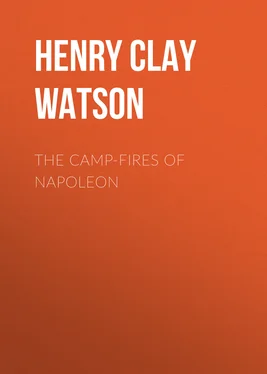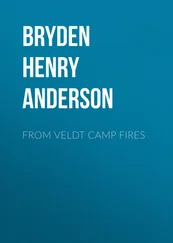Henry Clay Watson - The Camp-fires of Napoleon
Здесь есть возможность читать онлайн «Henry Clay Watson - The Camp-fires of Napoleon» — ознакомительный отрывок электронной книги совершенно бесплатно, а после прочтения отрывка купить полную версию. В некоторых случаях можно слушать аудио, скачать через торрент в формате fb2 и присутствует краткое содержание. Жанр: foreign_prose, foreign_antique, на английском языке. Описание произведения, (предисловие) а так же отзывы посетителей доступны на портале библиотеки ЛибКат.
- Название:The Camp-fires of Napoleon
- Автор:
- Жанр:
- Год:неизвестен
- ISBN:нет данных
- Рейтинг книги:4 / 5. Голосов: 1
-
Избранное:Добавить в избранное
- Отзывы:
-
Ваша оценка:
- 80
- 1
- 2
- 3
- 4
- 5
The Camp-fires of Napoleon: краткое содержание, описание и аннотация
Предлагаем к чтению аннотацию, описание, краткое содержание или предисловие (зависит от того, что написал сам автор книги «The Camp-fires of Napoleon»). Если вы не нашли необходимую информацию о книге — напишите в комментариях, мы постараемся отыскать её.
The Camp-fires of Napoleon — читать онлайн ознакомительный отрывок
Ниже представлен текст книги, разбитый по страницам. Система сохранения места последней прочитанной страницы, позволяет с удобством читать онлайн бесплатно книгу «The Camp-fires of Napoleon», без необходимости каждый раз заново искать на чём Вы остановились. Поставьте закладку, и сможете в любой момент перейти на страницу, на которой закончили чтение.
Интервал:
Закладка:
“It was a grand stroke of genius,” said Massena. “I was stationed on the dike at the left, so as to go up to Gombione and Porcil, and take the enemy in the rear, if he should march to Verona.”
“And I,” observed Augereau, “was despatched to the right, to debouch upon Villa Nova. But before I could advance along the right hand dike, I had to cross the Alpon by the bridge of Arcola. Some battalions of Croats were stationed along the river, and had their cannon pointed at the bridge. They received my advance guard with a rattling fire of musketry, and at first the men fell back. I rode up and did all in my power to push them on, but the fire compelled them to halt. Soon after that, I saw a party of Hungarian cavalry come to inquire into the reason of the firing among the marshes. The Austrian marshal could not understand it. He did not for a moment suppose that General Bonaparte would choose such a field of battle, at least I judge so, from his orders.”
“Ha! ha!” shouted Massena, “you should have seen Rivera leading his division close along the left dike where I was posted. I permitted them to get too far on the dike to retreat, and then dashed upon them at a run. How we tumbled them into the marsh! Ha! ha! The troops shot them by scores, as they floundered in the mud and water. Ha! ha!” It was a grim laugh.
“I did the same for Mitrowski’s division,” said Augereau. “I then pursued, and attempted to pass the bridge, the soldiers gallantly crowding around the flag I held to cheer them on. But they could not stand that tremendous fire. Lannes, Bon, Verne, and Verdier were wounded. In spite of my utmost efforts, the column fell back, and the soldiers descended to the side of the dike, to shelter themselves from the fire.”
“Then came the heroism of the ‘Little Corporal,’” exclaimed Duroc, his eyes glowing with enthusiasm. “He saw from Ronco, that Alvinzi had become sensible of his danger, and was striving to prevent you, brave Guyeux, from taking him in the rear at Villa Nova. He saw that it was of the utmost importance to cross the river at Arcola immediately, if he would gain Alvinzi’s rear, and thus secure great results. Did you see that glorious commander? He set off at full gallop, came near the bridge, threw himself from his horse, went to the soldiers who were crouching down by the borders of the dike, asked them if they were still the conquerors of Lodi, revived their courage by his words, and seizing a flag cried, ‘Follow your general!’ Hearing his voice, a number of soldiers went up to the causeway and followed him; unfortunately, the movement could not be communicated to the whole of the column, the rest of which remained behind the dike. Bonaparte advanced, carrying the flag in his hand, amidst a shower of balls and grape-shot. We all surrounded him. Lannes, who had already received two wounds from musket-shots during the battle, was struck by a third. Muiron, the general’s aid-de-camp, striving to cover him with his body, fell dead at his feet. The column was nevertheless on the point of clearing the bridge, when a last discharge arrested it, and threw it back. The rear abandoned the advance. The soldiers who still remained with the general, then laid hold of him, carried him away amidst the fire and smoke, and insisted on his remounting his horse. An Austrian column debouching upon them, threw them in disorder into the marsh. Bonaparte fell in, and sunk up to the waist. As soon as the soldiers perceived his danger, ‘Forward,’ cried they, ‘to save the general.’ They ran after Belliard and Vignolles to extricate him. They pulled him out of the mud, set him upon his horse again, pressed forward and Arcola was taken.
“Was there ever a more glorious man?” And as the enthusiastic Duroc concluded his animated description of the splendid exploit, his eyes gleamed in admiration of his great friend and patron.
“Yes,” said Guyeux, “Arcola was taken. But I could not get across the river in time to attack Alvinzi’s rear, and thus the Austrian was enabled to deploy into the plain. The general had striven gloriously, but he had not attained his object. In my humble opinion, he might have avoided the obstacle of Arcola by throwing his bridge over the Adige a little below Ronco.
“Aye,” said Massena, “but then he would have debouched into the plain, which it was of great importance to avoid. The general had the best reasons for doing what he did, and although the success was imperfect, important results had been obtained. Alvinzi had quitted the formidable position of Caldiero; he had descended again into the plain, he no longer threatened Verona; and he had lost a great number of men in the marshes. The two dikes had become the only field of battle between the two armies, which gave the superiority to bravery. Besides, so glorious had been the conflict, that our soldiers had completely recovered their confidence, a result of immense importance, as all may perceive.” This defence of Bonaparte’s course did honor to the intelligence of Massena.
“But it must be admitted,” said Bessieres, “that the battle of to-day surpassed all the rest in the display of strategic genius. Yesterday was glorious for us, for the bravery and perseverance of the whole army was exerted in beating the enemy from the dikes, and tumbling them into the marsh, and we destroyed an immense number of them. But to-day proved most conclusively that in strategy our general is at least the rival of the Carthagenian Hannibal. Our general saw that the long conflict had disheartened the enemy, and considerably reduced their superior numbers. He then dared to encounter them on the plain. You, General Massena, marching at the head of your column, with your hat upon the point of your sword, showed them the way to victory, and the Austrians were once more crowded into the marsh. But General Robert was repulsed at the bridge of Ronco. Yet mark the resources of the general-in-chief! Sensible of the danger, he placed the 32d in a wood of willows, which borders the right hand dike. While the enemy’s column, victorious over Robert, was advancing, the 32d sallied from its ambuscade, and, of the three thousand Croates who composed it, the greater part were slain or captured. Crossing the Alpon, Bonaparte brought the whole army into the plain, in front of the Austrians. An ordinary general would now have ordered a simple charge. But the ‘Little Corporal’ determined upon a stratagem. A marsh, overgrown with reeds, covered the left wing of the Austrians. Hercule, chef de battallion , was ordered to take twenty-five guards, to march in single line through the reeds, and to make a sudden charge, with a great blast of trumpets.”
“And Hercule was the very man for such a desperate service,” observed Duroc.
“Precisely,” said Bessieres. “Then the great charge was made by you generals, Massena and Augereau; but the Austrians stood their ground until they heard the great blast of trumpets, when, thinking they were going to be charged by a whole division of cavalry, they fled, and the battle was decided in favor of France. Italy is our own.”
“Not yet,” said Massena. “Austria is stubborn. In spite of her many defeats, she will make at least one more effort to recover possession of this fair land. We have much fighting yet to do, I am sure.”
“We have lost many brave men in these three fighting days,” said young Lemarois. “But the enemy have suffered a loss of at least twelve thousand killed, and six thousand made prisoners, while we have taken eighteen pieces of cannon and four stand of colors.”
“Trophies enough,” said Augereau. “It seems to me, that whether this battle has decided the fate of Italy or not, we shall soon have a short respite from our toils, which will give us time to recruit.”
The conversation continued thus till most of the officers, being overcome with fatigue, retired to their quarters. The Guides slept around their fires, in close proximity to numbers of the gallant dead, whose slumber was destined to be broken only by the archangel’s trump.
Читать дальшеИнтервал:
Закладка:
Похожие книги на «The Camp-fires of Napoleon»
Представляем Вашему вниманию похожие книги на «The Camp-fires of Napoleon» списком для выбора. Мы отобрали схожую по названию и смыслу литературу в надежде предоставить читателям больше вариантов отыскать новые, интересные, ещё непрочитанные произведения.
Обсуждение, отзывы о книге «The Camp-fires of Napoleon» и просто собственные мнения читателей. Оставьте ваши комментарии, напишите, что Вы думаете о произведении, его смысле или главных героях. Укажите что конкретно понравилось, а что нет, и почему Вы так считаете.












